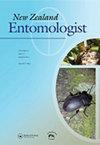Barry James Donovan博士
IF 0.4
4区 农林科学
Q4 ENTOMOLOGY
引用次数: 0
摘要
巴里·多诺万博士于2022年5月13日因心脏病发作去世,享年81岁。他在昆虫学方面有着长期而杰出的职业生涯,专门研究蜜蜂。巴里在新西兰科学和工业研究部(DSIR)工作了22年,然后在皇冠研究所成立时在土地保护研究所工作了5个月,最终于1992年在林肯大学成为一名独立的昆虫学家。他根据合同从事昆虫学研究,主要是植物与食品研究所,在那里他成为荣誉研究员,并继续这项工作,直到他去世前不久。巴里在昆虫授粉、蜜蜂分类和黄蜂生物控制方面的专业知识获得了国内和国际的认可。巴里有着杰出的事业和丰富的人生。作为新西兰怀疑论者的前成员,巴里会看到黑色星期五死亡的讽刺意味。巴里对昆虫学的兴趣始于他在新西兰北岛陶玛鲁努伊附近的皮里亚卡长大。上小学时,他就迷上了蜜蜂。当时,在没有保护的情况下,他把一群蜜蜂(Apis mellifera ligustica)转移到一个木制的苹果箱里,并好奇地看到蜜蜂在那里定居。巴里在上学期间的周末与当地养蜂人一起工作,获得了养蜂业的经验,最终获得了12个自己的蜂箱。他喜欢观察昆虫访花,这使他认识了蜜蜂,而不是更熟悉的蜜蜂或大黄蜂。此时,这些蜜蜂不容易被识别,巴里看到了识别这些物种的职业机会和角色。1959年,巴里在Taumarunui高中完成学业,在那里他是一名级长和学生会主席,他开始了奥克兰大学动物学学士学位的研究,并于1964年完成。他继续在奥克兰大学攻读研究生,并于1967年完成了硕士学位(荣誉)论文,主题是本地蜜蜂Leioproctus boltoni的筑巢生物学,Barry Donovan和他收集的大黄蜂标本(左),以及收集大黄蜂(右)。图片,经许可使用,来自Robert Lamberts(左)和Nikki Gammans(右)。本文章由计算机程序翻译,如有差异,请以英文原文为准。
Dr Barry James Donovan
Dr Barry Donovan died from a heart attack on 13 May 2022 aged 81. He forged a long and distinguished career in entomology, specialising in bees. Barry worked for the New Zealand Department of Scientific and Industrial Research (DSIR) for 22 years, and then for 5 months with Landcare Research when the Crown Research Institutes were formed, before eventually becoming an independent entomologist in 1992 based at Lincoln. He worked in entomological research under contract, primarily to Plant & Food Research where he became an honorary research fellow, and continued with this work until shortly before his death. Barry gained national and international recognition for his expertise in insect pollination, bee taxonomy and biological control of vespid wasps. Barry had an outstanding career and fruitful life. As a past member of the New Zealand Skeptics, Barry would have seen the irony of dying on a black Friday. Barry’s entomological interests began while growing up in Piriaka near Taumarunui in the North Island, New Zealand. He became hooked on bees at primary school when, unprotected, he transferred a swarm of honey bees, Apis mellifera ligustica, into a wooden apple crate and was intrigued to see the colony establish there. Barry gained experience in apiculture while working with a local beekeeper on the weekends throughout his school years, eventually acquiring 12 beehives of his own. He enjoyed observing insects visiting flowers and this introduced him to bees other than the more familiar honey bees or bumble bees. At this time, these bees could not easily be identified and Barry saw a career opportunity and a role in identifying these species. On completing his school studies at Taumarunui High School in 1959, where he was a prefect and Head Boy, Barry undertook a study for a BSc in Zoology from the University of Auckland, which he completed in 1964. He continued with postgraduate studies at Auckland, completing his MSc (Honours) thesis in 1967 on the nesting biology of a native bee, Leioproctus boltoni, on Barry Donovan with a bumble bee specimen from his bee collection (left), and collecting bumble bees (right). Photos, used with permission, from Robert Lamberts (L) and Nikki Gammans (R).
求助全文
通过发布文献求助,成功后即可免费获取论文全文。
去求助
来源期刊

New Zealand Entomologist
ENTOMOLOGY-
CiteScore
0.70
自引率
33.30%
发文量
3
审稿时长
>12 weeks
期刊介绍:
The invertebrate diversity of New Zealand is of great interest worldwide because of its geographic isolation and geological history. The New Zealand Entomologist plays an important role in disseminating information on field-based, experimental, and theoretical research.
The New Zealand Entomologist publishes original research papers, review papers and short communications. We welcome submissions in all aspects of science regarding insects and arthropods in a New Zealand or Australasian setting. The journal’s subject matter encompasses taxonomy, phylogenetics, biogeography, biological control and pest management, conservation, ecology and natural history.
The journal is the official publication of the Entomological Society of New Zealand. Papers published or submitted elsewhere for publication will not be considered, but publication of an abstract or summary elsewhere (e.g. conference proceedings) does not preclude full publication in the New Zealand Entomologist. Accepted papers become copyright of the Entomological Society of New Zealand. The journal is published in English, but we also welcome publication of abstracts in Maori.
 求助内容:
求助内容: 应助结果提醒方式:
应助结果提醒方式:


